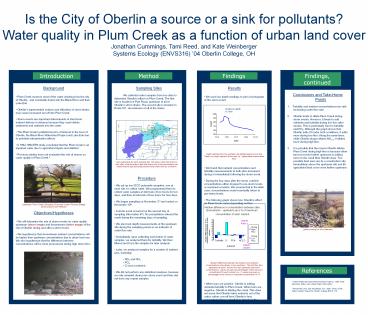Findings PowerPoint PPT Presentation
Title: Findings
1
Is the City of Oberlin a source or a sink for
pollutants? Water quality in Plum Creek as a
function of urban land cover Jonathan Cummings,
Tami Reed, and Kate Weinberger Systems Ecology
(ENVS316) 04 Oberlin College, OH
Findings, continued
Findings
Introduction
Method
- Background
- Plum Creek receives most of the water draining
from the city of Oberlin, and eventually drains
into the Black River and then Lake Erie - Oberlins impermeable surface and utilization of
storm drains may cause increased run-off into
Plum Creek. - Storm events are important determinants of
short-term nutrient delivery in streams because
they wash debris, sediments and nutrients into
the water. - The Plum Creeks pollutant level is of interest
to the town of Oberlin, the Black River Watershed
Project and Lake Erie due to potential
eutrophication effects - A 1992-1994 EPA study concluded that the Plum
Creek is an impaired water due to agricultural
inputs and siltation1 - Previous studies have not evaluated the role of
storms on water quality in Plum Creek 2.
- Sampling Sites
- We collected water samples from two sites to
determine Oberlins effect on Plum Creek. The
first site is located on Pyle Road, upstream of
all of Oberlins storm drains. The second site is
located on Route 511, downstream of all of the
drains.
- Results
- We used our depth readings to plot a hydrograph
of the storm event
- Conclusions and Take-Home Points
- 1. Turbidity and nutrient concentrations rise
with increasing water flow rate - 2. Oberlin tends to dilute Plum Creek during
storm events. However, it tends to add nutrients
and turbidity during low flow after storms. This
is particularly true for turbidity and PO4.
Although the graph shows that Oberlin adds Cl
under both conditions, it adds more during low
flow. Along the same lines while Oberlin always
dilutes NO2,3 it dilutes more during high flow. - It is possible that the reason Oberlin dilutes
Plum Creek during high flow is because other land
cover/use farther upstream is adding more to the
creek than Oberlin does. Two possible land uses
are A) a construction site immediately above the
upstream site and B) agricultural land cover even
farther upstream.
References
1 United States Environmental Protection Agency.
1998. Total Maximum Daily Load Listed Water
Information. 2 Fessenden, R.B. and Timberlake,
R.T. 2000. Plum Creek Water Quality Report for
Oberlin College ENVS 316.

